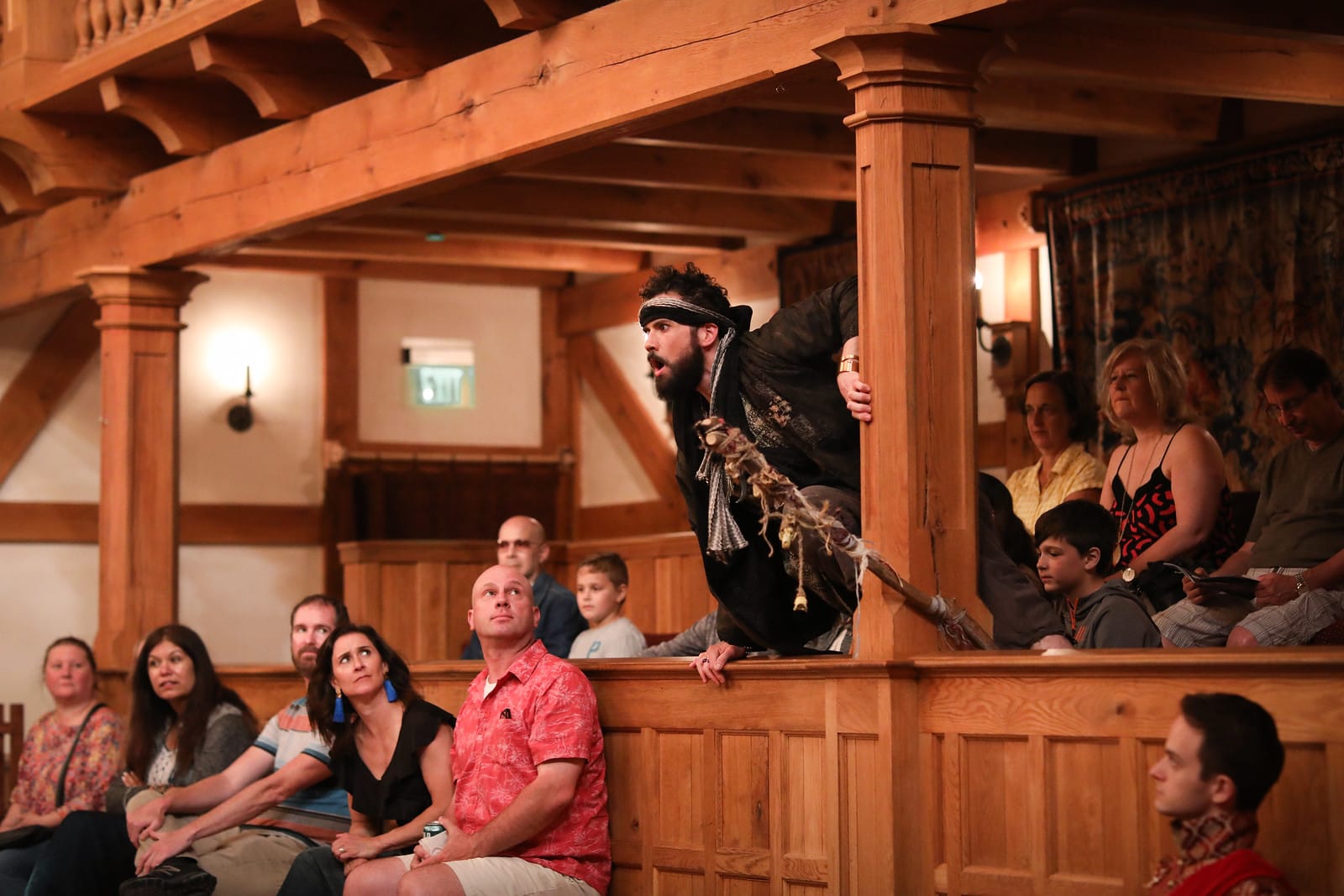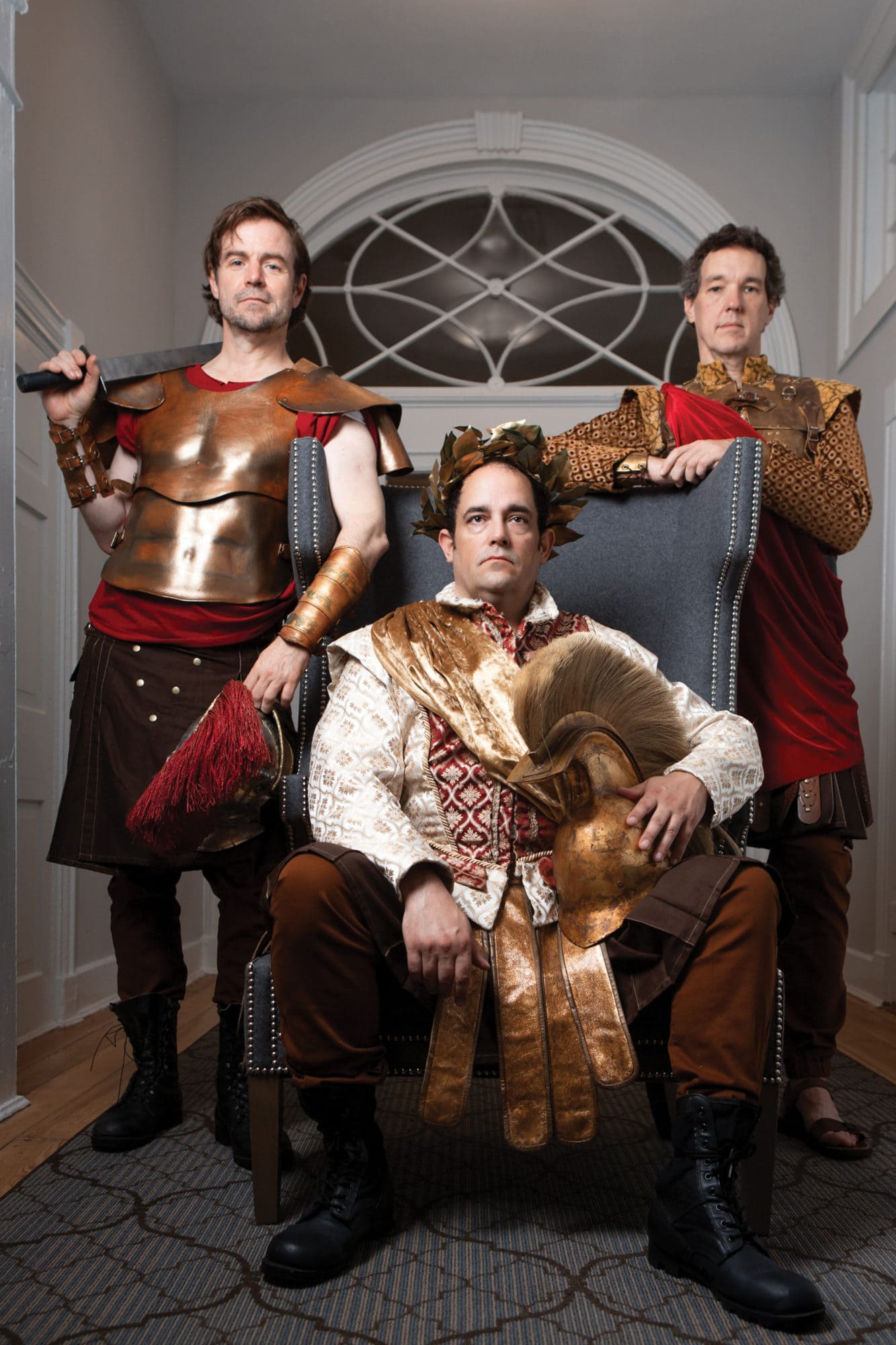You know you’re in for a new take on Julius Caesar when the famous Soothsayer (“Beware the Ides of March!”) doesn’t enter upstage right or left, as usual, to make his warning. In Ethan McSweeny’s latest take, wrapping up a spectacular run this month at the Blackfriars Playhouse in Staunton, Virginia, he hops up on an audience railing, seated casually against a pillar, practically in the audience’s lap. Sporting a truly creepy blind-man’s contact lens in one eye, actor Ronald Román-Meléndez then leaps onto the stage fearlessly to confront the conquering hero.

And they’re just getting started, folks. Stuff’s getting real.
Julius Caesar is one of Shakespeare’s greatest historical dramas, featuring a cast of characters whose names—Caesar, Brutus, Antony, Octavius—are indelibly linked with the decline and fall of a republic, and the dawn of raw, imperialist ambition. It has, of course, become all too relevant once again in our own shaky times, as our own republic teeters on the edge of impeachment, and worse.
Here’s the thing; over the past 20-30 years, we have witnessed a sea change in our understanding of how Shakespeare works. The American Shakespeare Center and Staunton’s Blackfriars (based on the original Globe company’s indoor space, where they did shows during the offseason) has developed a massive following, proving that historically-informed performance spaces fit both actor and audience like a glove. Caesar is a perfect vehicle for the ASC’s brand of theatre.
The question for this acting company and its famous theater has been: now what? We know these Renaissance spaces work, but is there anything else to be done? Hell yeah—McSweeny, working with a seasoned company that knows the Blackfriars like the backs of their hands, has broken out of traditional stage-based mode and opened up the entire space, even its most remote corners, to re-energize the Bard’s work.
One of the potential pitfalls of the Renaissance theatre movement has been to rely too heavily on a more museum-like presentation that largely confines the action to the stage itself. But if you conceive of the entire theatre as a stage—every aisle, every floor, every nook and cranny—the classics come alive and reveal themselves to be even more urgent than before. And with political intrigue and partisan divisions at a fever pitch these days, this Julius Caesar can seem shockingly familiar.
David Anthony Lewis leads the cast as an especially imposing, complex Caesar, whose seemingly iron will is still vulnerable to suggestion and flattery. His opposite, John Harrell’s Marcus Brutus, is the refined, Ivy-League debate team leader who preaches the gospel of fair play and wins on points, but fails to win hearts and minds when it matters most. Urging Brutus on to revolt is Brandon Carter as Cassius, whose fierce passion can scarcely hide his other less noble motives for getting rid of Caesar.

As we all know, the real danger wasn’t killing Julius Caesar; it was pacifying the common people of Rome afterwards. So the centerpiece here is McSweeny’s take on the famous funeral scene; as Mark Antony, Geoffrey Kent is a study in shameless demagoguery. His booming voice lights up the ensemble, scattered throughout the audience, representing a mob that is not easily conned (or so they think).
Thanks to McSweeny’s deft direction here, you watch with horrified fascination as Antony improvises his way into the mob’s heart. Not every line of his works; the moments of push-back are a reminder of how tenuous Antony’s position really was. But as certain prominent politicians do today, Antony lets the mob have its jabs and then reels them in with lie after bald-faced lie—his copy of Caesar’s will was, of course, a pathetic fiction. Once Antony knows what the mob wants, he gives it to them–and the rest is history.
The battle scenes which ensue are, like other moments here, uniquely fascinating, and Geoffrey Kent’s fight choreography is simple but effective. But there’s a new effect which is even more striking; when you walk into the Blackfriars space you have an immediate sense of its architectural scale, but McSweeny works the acoustics to the point where, hearing the distant cheers of a Roman army, you’d swear you were on the fields of Philippi listening to a regiment a half-mile away. That’s a first, and a truly wonderful one at that.
There are some fine theatrical turns here to round out the spectacle: Michael Manocchio’s (Act 1) Casca is as slick and dismissive as his (Act 2) Octavius is cold-blooded. Constance Swain’s turn as Lucius, Brutus’ servant, is by turns hilarious and touching (her attempt to strum a strum stick in Brutus’ tent while asleep is a real treat). Ronald Román Meléndez, meanwhile, balances the sobering Soothsayer with his utterly ridiculous Poet–who barges into the tent, interrupting Brutus’ deadly-serious argument with Cassius over the abuse of (military) campaign funds and the malign influence of dark money.
Another neat trick here is the way McSweeny weaves the Blackfriars’ trademark pre-show and intermission music with the play’s plot; the final song of pre-show becomes a celebration for Caesar, the conquering hero returned from Pompey’s murder, while Chris Johnston’s solo tune, guitar-in-hand, at the end of intermission marks him as Cinna the Poet—whose assassination marks the beginning of the second act.
Costumer Murell Horton has decked the cast with rust-colored mule-skin trousers, topped by a variety of motifs—leather skirts, breastplate, tunics, etc.—to suggest Rome, while not falling into abject historical accuracy. The production marks a fitting launch of a new era at the American Shakespeare Center, and its exploration of Blackfriars as a complete instrument for performance is most welcome.
Running Time: Two and a half hours, with one intermission.
Julius Caesar plays through November 30, 2019, at American Shakespeare Center’s Blackfriars Playhouse, 10 S. Market Street, Staunton, VA. Purchase tickets online.
NOTE: Julius Caesar is currently a part of ASC’s Fall Season, in repertory with Antony and Cleopatra (read our review here), George Bernard Shaw’s Caesar and Cleopatra, and the world-premiere musical The Willard Suitcases. The repertory will come to a close on December 1—get busy, and get tickets!





What a wonderfully upbeat review. Kudos to you all!!!!!!!!!